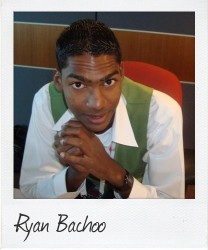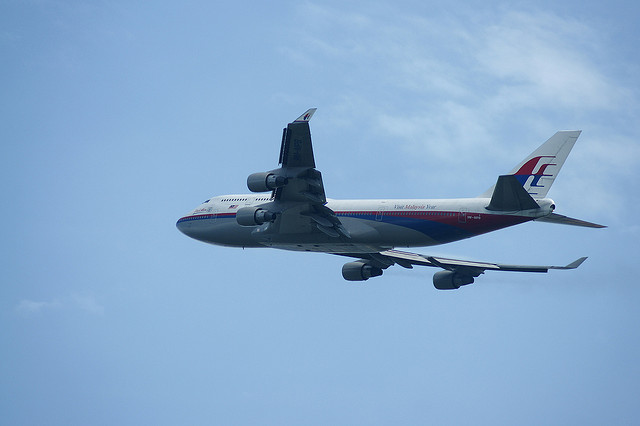"Criticizing the aviation industry is unjustified"
March 25th, 2014 The fast food nature of our modern, technology-driven society has caused us to think instant problems require instant solutions, writes Ryan Bachoo, 24, a Commonwealth Correspondent from Trinidad and Tobago. However, this line of thought cannot be applied to every challenge – and the missing Malaysia Airlines flight is one of them.
The fast food nature of our modern, technology-driven society has caused us to think instant problems require instant solutions, writes Ryan Bachoo, 24, a Commonwealth Correspondent from Trinidad and Tobago. However, this line of thought cannot be applied to every challenge – and the missing Malaysia Airlines flight is one of them.
In this modern world we live in, even among this cosmos of millions and millions of square miles stretching from Australia to America and beyond, we have grown to think we live in a very small world.
As the centuries ticked by, technology has made the world smaller and smaller for humans.
Today, we can pick up the phone and call someone on another continent and with social media advancements over the last decade, we have friends in different countries we have never met but we talk to constantly. So whenever I chat with my friend from Austria who I never met, it still feels like I have known her for a long time and she lives right around the corner.
This February made three years I’ve been writing for the Commonwealth, but have never physically met my editors in Europe and we get along quite well.
Every now and then circumstances occur that remind us of just how vast and big this world really is. The latest incident was the missing Malaysia Airlines Flight MH370, which left Kuala Lumpur en route to Beijing on March 8th. As I write, it is Day 10 that the Boeing 777 jet has not been found.
There have been many criticisms towards the handling of the accident, a few of them justified. One criticism that caught my eye is directed towards the aviation industry. I read through a few comments on a forum online which said: “Absolutely ridiculous that in this day and age an airplane can go missing without a trace,” a view widely supported by the number of ‘likes’ it received.
But again, this view was exercised on a social media platform forum, the number one place where the walls of the world close into a bedroom.
In that one bedroom, the people from America, South Africa, France, Australia and Dubai are all there; on Skype, Facebook, Twitter.
However, in our little worlds of tablets and mobile phones, we take for granted just how big the world still is. We can hop on an airplane and hop off six hours later in another part of the world… which we still complain about oblivious that our ancestors would have had to take three month to make the same trip by ship. By the way, we didn’t even leave our houses to get the plane ticket because airlines offer a wonderful online e-ticketing service.
So as easy as technology makes our daily lives easier, we expect that scientists and aviation experts should have every answer to every arising problem, an assumption which is unfair to those who work long hours trying to make the next best thing we will buy. By the way, we won’t line-up to go buy it, but order it online and probably tell the delivery guy to bring it into the house.
In reality, from what aviation experts have so far theorized is that the Aircraft Communications Addressing and Reporting System (ACARS) was turned off at 1:07 a.m. The transponder was also shut down. These two systems are very complex and are placed at the back of the pilot’s seat because they are in very, very rare cases to be interfered with. In fact, it would only take a very experienced pilot to know about both systems. Most pilots are not aware of which breakers and cables can be used to shut off the aircraft’s radar system.
Aviation experts have narrowed the causes down to either the pilots or terrorists. However, for many people, it will not be enough, because we live in a ‘today world’, from the fast food we grab to the news that is everywhere and in our faces. Some things though still take time, no matter how impatient we are for action.
Criticizing the aviation industry for not finding a needle in a haystack is unjustified and uncalled for. What we have on our hands now is a potentially new threat – not just terrorists lurking in the back of the plane, but some who may be in the cockpit as well.
photo credit: Fizal’s Photography via photopin cc
………………………………………………………………………………………………………………
About me:
“Hi, my name Ryan Bachoo. I’m a Journalist and Public Relations Practitioner from Princes Town in the twin island of Trinidad and Tobago. I’ve moved into the field of Mass Communication now. I currently work for the West Indies Cricket Board, protecting the online image of West Indies Cricket.
I’ve been a Broadcast Journalist at Cable News Channel 3 for three years. For the Commonwealth Youth Secretariat, I write on topics of politics, war and economics.”
Ryan Bachoo
Journalist & Public Relations Practitioner
The People’s Writer
I speak for those who have no voice!
…………………………………………………………………………………………………………………
Opinions expressed in this article are those of the author and do not necessarily represent the views of the Commonwealth Youth Programme. Articles are published in a spirit of dialogue, respect and understanding. If you disagree, why not submit a response?
To learn more about becoming a Commonwealth Correspondent please visit: http://www.yourcommonwealth.org/submit-articles/commonwealthcorrespondents/
…………………………………………………………………………………………………………………




